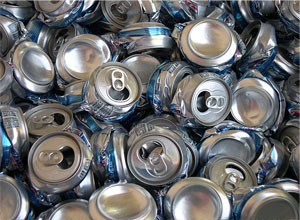By Ajibola Ameerah
Aluminium is a silvery-white, soft, non-magnetic ductile metal. It is the third most abundant element (after oxygen and silicon) in the Earth’s crust, and the most abundant metal there.
Aluminium cans are the most environmentally friendly and most recyclable type of container in the world. Aluminum cans allow the contents inside them to retain their taste, while protecting them from the negative impact of the elements. It is very durable and has a long life span. In addition, the can itself does not get rusty or lose its properties in any way. These are probably the most important reasons why aluminium is widely used for food packaging.
Aluminium recycling is the process by which scrap aluminium can be reused in products after its initial production. The process involves simply re-melting the metal, which is far less expensive and energy-intensive than creating new aluminium through the electrolysis of aluminium oxide (Al2O3), which must first be mined from bauxite ore and then refined.
It is very beneficial to recycle aluminium, recycling scrap aluminum requires only 5% of the energy used to make new aluminum, and in addition, 10 cubic yards of landfill space are saved for every ton of aluminium recycled. Recycled cans can be used to make furniture, airplane, appliances and more.
A major problem likely to occur from improper disposal of aluminium cans is environmental pollution. This comes from the fact that aluminium cans are non- biodegradable. This means that it takes a very long time for aluminium to be degraded and so, a lot of these cans end up in landfills or lay on the streets. Just like every other non-biodegradable material, it goes further to block drainage causing flood and gives rise to stagnant water which causes other health associated problems.
When aluminium cans are wasted, they must be replaced with new ones made from raw materials. Mining of these materials poses a great threat to the environment. Toxins are released into the soil and water when bauxite is mined and processed for refining into alumina. For every ton of aluminium produced, about 5 tons of caustic red mud wastes are produced along with a host of other pollutants including airborne emissions, toxic liquid effluents, etc.
The safety of man’s health in the environment is endangered due to the fact that once the environment is polluted, a lot of toxic waste are released which will result in respiratory diseases, poisoning, etc.
In the long run, we will be at the losing end when we fail to take proper care of our environment.
Don’t just throw your cans away, dispose them properly by supplying to appropriate waste management agencies.
CULLED FROM
https://en.wikipedia.org/wiki/Aluminium
http://www.aluminiumleader.com/application/packaging/#rec2548802
https://en.wikipedia.org/wiki/Aluminium_recycling





